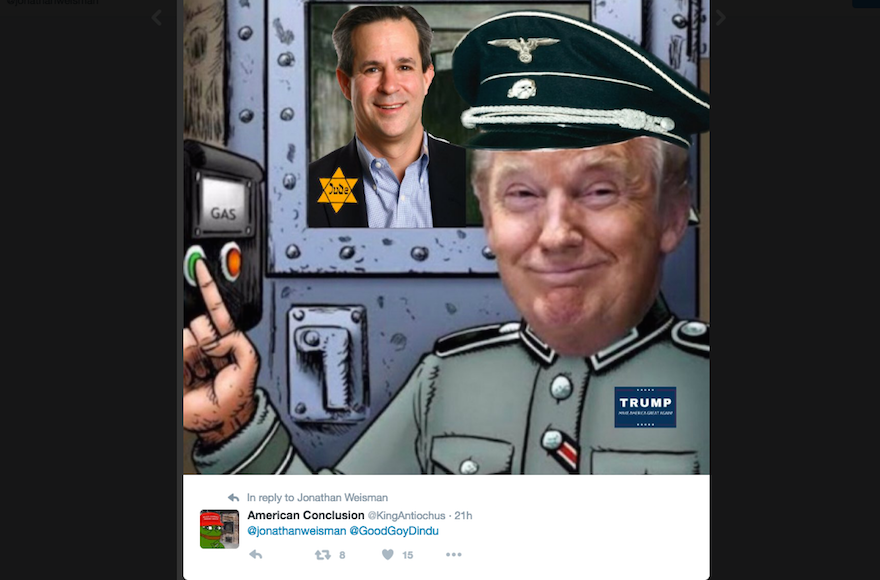NY Times editor calls out Donald Trump for ignoring supporters’ anti-Semitic tweets
Published May 26, 2016

A tweet sent to Jonathan Weisman depicts the journalist as a concentration camp inmate and Donald Trump as a Nazi guard. (Screenshot from Twitter)
(JTA) — A New York Times editor who has received a deluge of anti-Semitic tweets from supporters of Donald Trump is calling on the presumptive Republican presidential nominee to denounce the invective and support its targets.
In an article published in the paper’s Sunday edition, Jonathan Weisman summarizes the deluge of tweets he has received from writers identifying themselves with handles like “Trump God Emperor,” “CyberTrump” and “@DonaldTrumpLA.”
Their tweets have insulted his “Ashkenazi intelligence,” included a doctored image of the gates of Auschwitz and featured a menorah made of the number 6 million.
Others show Weisman as a concentration camp inmate being guarded by an image of Trump in a Nazi uniform, a grotesque caricature of a Jew labeled “The Holocaustinator” and a Nazi-era cartoon of an Aryan roughing up a stereotypical Jew.
@SpectreReturns @Ted_Newton @jonathanweisman pic.twitter.com/eoW1HNNDOB
— Naughty Raspberry (@HelloRaspberry) May 19, 2016
“And still, we have heard nothing from Mr. Trump, no denunciation, no broad renouncing of racist, anti-Semitic support, no expressions of sympathy for its victims,” writes Weisman, an editor in the Times’ Washington bureau. Weisman is also critical of a statement by the Republican Jewish Committee, issued Tuesday, that criticized “anti-Semitic invective” in the presidential race but without singling out the actions of Trump supporters.
@vicmandrake @jonathanweisman pic.twitter.com/1MAYR1ZY3G
— Naughty Raspberry (@HelloRaspberry) May 19, 2016
Weisman describes the RJC statement — which abhorred abuse of journalists “whether it be from Sanders, Clinton or Trump supporters” — as “equivocation as an art form.”
READ: Author of Melania Trump profile files police complaint after deluge of anti-Semitic abuse
He says he is preserving the anti-Semitic tweets – rather than blocking them, as Twitter administrators advised him — as “a research tool of sorts, a database of hate, and a shrine to 2016.”
He acknowledges in the article that he had “become largely disconnected from Jewish life and faith over the years.”
But as a result of the Twitter attacks, he writes, “I found myself staring down a social-media timeline filled with the raw hate and anti-Semitic tropes.”














